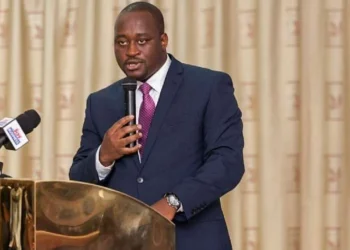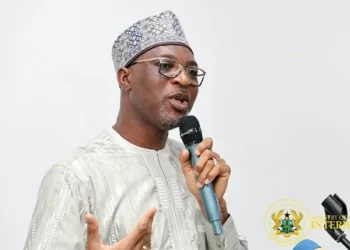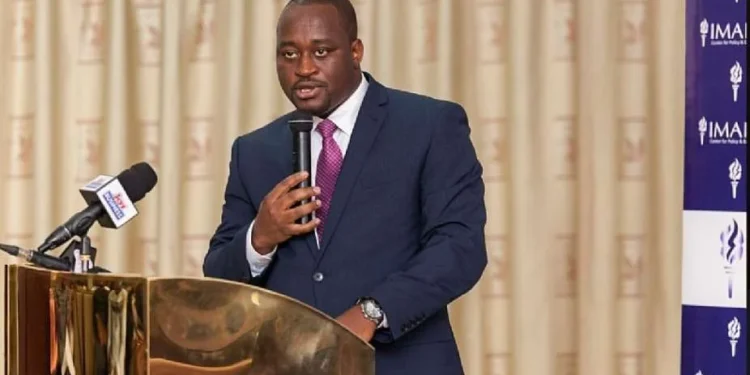The Chairman of the Works and Housing Committee of Parliament and MP for Atwima Mponua, Hon. Isaac Kwame Asiamah, has issued a fervent plea to the government to swiftly initiate work on the Keta Sea Defense project, stressing the critical need to safeguard lives and properties along the coastline.
Hon. Asiamah’s call came during a monitoring visit to various constituencies, including Keta, Anlo, and Ketu, alongside officials from the Works and Housing Ministry and the Ghana Hydrological Authority.
Highlighting the urgency of the situation, Hon. Asiamah revealed that the government had secured a substantial World Bank Fund of One Hundred and Fifty Million Dollars specifically allocated for the Coastal Development Project. However, he expressed deep concern over the prolonged delay in commencing the much-needed sea defense initiative.
Hon. Isaac Kwame Asiamah noted, “We need to secure and protect our historical heritage along the Coast where we have Forts and castles, we can’t sit down and allow this to be destroyed.”
One of the key issues raised by Hon. Asiamah was the failure of the Volta River Authority (VRA) to dredge the Volta estuary for nearly eight years. This negligence has resulted in devastating tidal waves, particularly affecting three communities in the Anloga Areas.
In response to this failure, Hon. Asiamah announced that the Committee intends to summon VRA officials to appear before Parliament, emphasizing the need for accountability and responsibility.
The Committee, led by Hon. Asiamah and including the ranking member, Hon. Vincent Oppong Asamoah, MP for Dormaa West, called for increased government investment and prioritization of resources to combat the tidal wave threat along the coastal lines.
They also engaged with Municipal Chief Executives in the affected constituencies, discussing the impacts of sand winning and exploring strategies to mitigate this environmental issue.
Keta Sea Defense Project

The Keta Sea Defence project is a comprehensive initiative aimed at protecting the coastline from Keta to Hlorve in Ghana. This project was designed to combat chronic and occasional erosion along the coast and flooding, as well as to reclaim land from the Keta Lagoon for the expansion of human settlements.
Additionally, it sought to establish a connection between settlements from Keta to Hlorve. The project was funded by the World Bank, with the first phase costing approximately €100 million. The construction began in October 2010 and was initially projected to be completed by December 2011, but it was actually finished in October 2014.
The project involved dredging an estimated 15 million cubic meters of sediment using a Cutter Suction Dredge. The first phase, known as the Blekuso Project, started in 2015 and was completed. The second phase aimed to extend the defense along a minimum of 8 km along the coastal stretch.
The project faced controversies, including allegations of insensitivity towards the plight of the Keta people and debates over the allocation of funds for the project. Despite these challenges, the government of Ghana allocated about 10 million Ghana cedis for communities affected by tidal waves.
The project also received appeals from local chiefs for the government to address the issues of waves and to ensure the dredging of the Keta lagoon for land reclamation and development purposes.
The Keta Sea Defence project is part of a larger effort to manage coastal erosion and flooding in Ghana, addressing significant environmental and developmental challenges along the country’s eastern coast.
The visit served as a stark reminder of the pressing need for immediate action to protect vulnerable communities along Ghana’s coastline. With lives and livelihoods at stake, Hon. Asiamah’s call for urgency underscores the gravity of the situation and the imperative for concerted efforts to commence the Keta Sea Defence project without further delay.
The urgent call for action by the Works and Housing Committee underscores the severity of the situation facing coastal communities in Ghana. The Committee’s efforts to hold the VRA accountable and their recommendations for increased investment and strategic planning highlight the need for immediate and decisive action to safeguard lives and properties in the face of environmental challenges.
READ ALSO: Rising Prices Threaten Chocolate Industry























